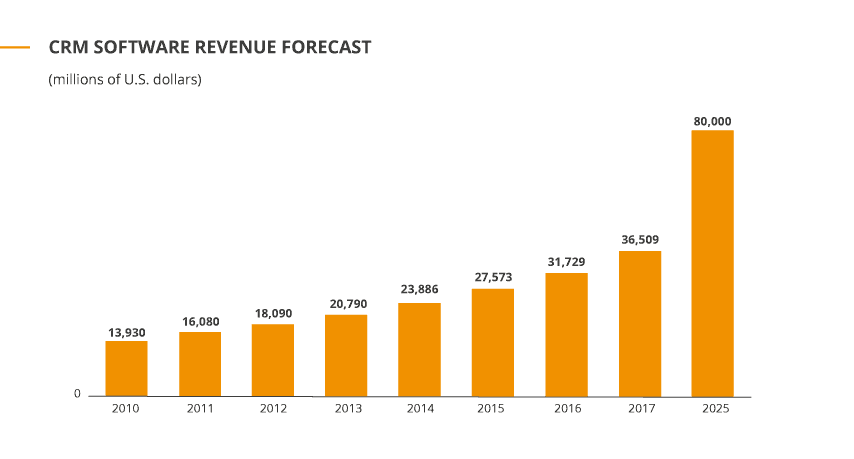
How to manage a nearshore software development team?
Analysts in growing numbers agree that the changes introduced by the outbreak of the Coronavirus disease pandemic will have an essential impact on the progress of digital transformation of enterprise.
COVID-19 will work as a catalyst of changes, that have been already taking place for a longer period of time, and it may turn out, that the enterprises that were hesitant or lingered in regard to introducing key changes in their processes, will be affected by the crisis results on a much more painful scale than the digitally transformed competition.
How enterprise software development is changing?
One of the aspects, where these changes will be visible the most, is enterprise software. The last decade was already exceptionally significant to this category of products. Already, some years back, it was very well known, that the enterprise software had changed its function dramatically. From a tool that aided the processes in organisations, the software had become a factor which shapes the organisations themselves. The use of artificial intelligence elements, as it is how the various machine learning algorithms are being perceived, opened new possibilities for companies, regarding the process of product design, sales, analytics, customer support, and numerous other aspects.
Many factors demonstrate that the pandemic will not only not slow down the changes taking place, but it will be their accelerator. According to Thomas Siebel, the author of „Digital Transformation: Survive and Thrive in an Era of Mass Extinction”, currently, companies have little or no choice – they must change. Stagnation and the delay of digital transformation, may come as an existential hazard to many companies, while the means of surviving is – obviously – technology. This way we approach the expenditure on IT – how to allocate resources in order not to be? tempted by solutions that are eye-catching, but not always profitable, and at the same time, implement practical and successful innovations efficiently
Nearshoring strategy – grasp all, lose all
One of the challenges, that remain within the IT industry is the deficit of highly qualified specialists. It is one of the reasons for the increasing interest in services outsourcing, and this interest will surely by growing within the upcoming months as well when head-hunting and conducting effective recruitment processes will be made particularly difficult. Outsourcing is the answer to the challenge, also – or maybe primarily – within enterprise-class software development, as it is the flywheel of digital transformation. It is possible, that previously built in-house development teams have never been threatened as such – both in terms of financial profitability and the quality of yielded results – as currently, in the face of the upcoming crisis.
However, it is worth noting, that equally high risk may weigh on decisions based on patterns perpetuated through years, that were born out of – let us not shy away from such periodisation – the age before the pandemic outbreak. The search for partners that were subject to different legal reality or building a nearshoring strategy based on cutting costs may turn out to be a bad idea. Today, organisations cannot afford to cut costs, as operating solely on the factors of cost optimisation may yield low-quality results. Grasp all, lose all.
Agile nearshore software development
In light of the aforementioned, the growing number of organisations direct their attention towards agile nearshore software development, which should not come as a surprise. Nearshoring is the answer to a major portion of the current, already mentioned challenges. During the attempts at organising in-house software development teams the entry threshold alone is very high – regardless of the pandemic, the employee market in IT is still doing well, and the decisive voice in the development of negotiations still belongs to the potential candidates. It is worth noting, that HR departments often lack competencies allowing to verify the quality of the professional achievements of the candidates. Outsourcing – particularly nearshoring, where we have good access to data regarding neighbouring of the proximate market – offers services that provide staff composed of highly experienced experts.
Currently, it is clear that one of the key elements of digital transformation will be the changes in work organisation. Numerous employees have learned, or will soon learn, that the majority of their tasks may be performed in front of computers at their homes, without the necessity of going to the office. The increasing awareness regarding the benefits of remote work will also contribute to the increase of popularity of the remote software development teams service. The issue should not be underestimated – due to nearshoring we avoid the risk related to the potential paralysis of works, resulting from the limitations within the scope of freedom of movement.
On the other hand, if such necessity would come into place, nothing would stand in the way of organising regular summary meetings or video-conferencing meetings – a difference in time zones will never be an obstacle for nearshoring.
An interesting opinion regarding the impact of the popularisation of telecommuting on enterprise is presented by Muddu Sudhakar, the CEO of Aisera. Sudhakar is convinced that „The remote work lifestyle will eat the enterprise. Companies have already made huge investments for this and will not abandon these efforts when the virus fades”. The perspective of the decline of traditionally „office-wise” perceived enterprise will obviously be an impulse for a swift evolution of enterprise software.
The processes that have been to this moment executed in a way, that was born within the corporate culture of the 20th century, will have to move to the virtual world in the current reality, which poses new priorities for enterprise software developers. Can anyone afford to work by means of trial and error now? Or maybe it is better to take advantage of the expert knowledge of developer teams that are qualified and experienced in this field?
Accept that uncertainty
That is not all. Although to many it is not as obvious, the last couple of years have demonstrated, that while choosing outsourcing partners, one must also consider a factor, that just a few years back had in no way been related to the IT industry.
We are talking about regulations and broadly perceived political operations. Suffice to analyse how the process of expanding access to 5G technology, or changes, the introduction of which the GDPR is determining in European Union countries – we are talking about a new reality, where it is better to have partners in organisations that operate in similar legal circumstances. This way, not only do we achieve greater stability, but also a product that is throughout designed in compliance with local regulations and norms.
Digital transformation requires innovation, and innovation requires taking risks. For the time of crisis and uncertainty, many organisations will hold off decisions on making important changes, which, however, is evaluated as a maximum risk by the analysts. They are more inclined towards statements, that it is the companies that hold a tightly to the current solutions, will be the most affected by the crises, while the organisations that take advantage of accelerating information will be more resistant to unstable conditions.
It is well summarised by Paulo Rosado of OutSystems: „accept that uncertainty is a fundamental attribute of innovation”. However, the aforementioned uncertainty may be limited due to the selection of a digital transformation partner who is efficient and experienced. Especially, as the process will most surely not slow down, and only increase in speed.






